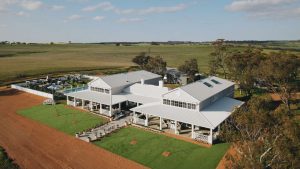Last month Jane Foster facilitated a GRDC Farm Business livestream discussing Wills and Powers of Attorney with Russell Robertson from O’Farrell Robertson McMahon Lawyers in Bendigo.
Wills and Powers of Attorney are a regular area of discussion with our clients and requires specialist information as it can be a daunting process. A process made a lot simpler with good advice and guidance.
The main take home message from Russell, during the livestream was ‘you can control the outcome, but you have to take action’. Before you act it’s important to understand the process and choices available to you.
What makes up your estate?
| Assets you personally owned or had interest in, less any liabilities that you owe make up your estate. This may include things such as houses, land, bank accounts, shares or super. Your Will outlines the directions you have put in place for how your estate should be dispersed after you have died. |  |
There are some assets that are dealt with outside your Wills:
Superannuation
Superannuation death benefits aren’t automatically included as part of your estate and the superannuation trustee has discretion to distribute the superannuation benefit in any combination of the following:
- Surviving spouse*
- Children
- Individual who was in an interdependent relationship with the deceased i.e. housemate, people you provided financial, domestic support or personal care to.
- Estate
*Under superannuation law a spouse is defined as de facto partners and spouses, unlike tax law only applies to current spouse.
To make a nomination about how your superannuation funds are applied after your death you need to complete a document known as a ‘Binding Death Nomination.’ These nominations can be lapsing or non-lapsing – a lapsing binding death nomination will expire every 3 years, whereas a non-lapsing nomination will be ongoing in perpetuity.
Cash within super can either be taxable or tax-free, and deciding on who receives these funds can be important.
- If paid to your spouse it’s tax free.
- If paid to a child under 18 years of age it’s tax free.
- If paid to a child over 18 years of age it’s taxed at 15%.
Most super funds also have life insurance, this pay-out will be taxed at 30% if not given to one of the tax-free recipients listed above.
What happens to property that’s jointly owned?
Properties can be owned as tenants in common or jointly and depending on which, is how the other half of the ownership will transition.
Tenants in common ownership doesn’t automatically transfer to the surviving owner but is vested in the deceased’s Will.
Joint tenants will be an automatic transfer to the surviving joint tenant outside of the will.
You can check your ownership method by looking at the land titles.
For bank accounts in joint names:
| Business Partners | Tenants in Common |
| Personal Accounts | Joint |
| Husband & Wife Partnership | Joint |
| Other Partnerships | Tenants in Common |
All the bank requires to unfreeze the account for joint bank accounts is a copy of the death certificate.
Family Trusts – If you are a beneficiary of a trust, those assets are not legally yours.
 |
If you operate a business or own land through a Family Trust, you do not personally own the assets of the trust and as such, they will not be considered as part of your estate.
A trust is operated by trustees for the benefit of the beneficiaries, but the party who really controls the trust is the person nominated as the Appointer in the trust deed. |
If you are the Appointer of a trust, then it is important to ensure that the control of the trust is considered when going through the process of making a Will.
When purchasing land, it’s important to think about where you’d like the land to go when you pass. It might be more beneficial to have land in different trusts if your wish is for them to pass onto different people.
Companies
If land is held in a company, you can leave company shares to people in your Will but again not the actual assets in the company.
Who should my executors be?
Executors are appointed to make sure the wishes in your Will are carried out so they should be competent and capable of performing the role. Russell suggests that the most likely candidates for this role are those who are the primary beneficiaries of the Will, which could include a spouse or adult children for example. It is preferable that if two people are nominated they are from separate households and they should be informed of their roles and provided reasoning behind the contents of the Will.
Power of Attorney
There are two types – financial and medical. You nominate people to make decisions on your behalf and in your best interest if you’re unable to. Financial examples could be signing bank documents if you’re unable due to injury or distance. For medical they can both refuse and consent to treatment on your behalf. A next of kin can only consent to medical treatment, not refuse treatment. It’s therefore very important to have conversations with your PoA’s in case this situation occurs, and they know what your wishes are.
| It’s never too early to start planning your estate and it’s important to include all your advisers in the discussions to ensure your plans are achievable and don’t become a burden to your loved ones. Also remember that fair and reasonable may not necessarily be equal. |  |
Rebecca Sexton, Business Consultant